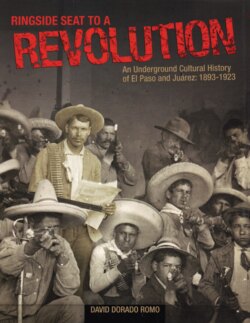Читать книгу Ringside Seat to a Revolution - David Dorado Romo - Страница 53
На сайте Литреса книга снята с продажи.
ОглавлениеVICTOR L. OCHOA’s grand visions about airplanes flying around the world at 300 miles an
hour took decades to come true. So would his plans to overthrow the government of Porfirio
Díaz. Yet although he was ahead of his time, he was also very much a man of his era.
In turn-of-the-century El Paso, the spirit of invention was in the air. There was a feeling that
great change was possible. The first telegraph was installed in the city in 1877. The railroad line,
the Southern Pacific, arrived in El Paso on May 19, 1881, and it completely transformed the city—
both for better and for worse. Telephone lines connecting El Paso and Juárez were initially estab-
lished in 1883. The electric light bulb replaced gas lamps inside many of the city’s buildings in
1884. In 1896 an Edison Vitascope projector displayed the first moving pictures in El Paso. The
first automobile to arrive in the city was an Elgin in 1900. In January 1902, when the electric trol-
ley ran for the first time between El Paso and Juárez, thousands of people gathered in the City’s
main thoroughfares to celebrate the event. If revolutionary transformations were occurring at the
scientific and technological level, why not at the political one as well?
The same restless energy and personal qualities that made Victor Ochoa an inventor, made
him a revolutionary too. Both invention and revolution are matters of trial and error. Both pro-
fessions attract their share of visionaries, cranks, lunatics, hucksters, entrepreneurs, and a few
authentic geniuses and idealists who want to dedicate their lives to the improvement of human-
ity. Ochoa had a bit of all of these in him.
BY THE TIME of his death at age 85, Victor L. Ochoa had built up quite a resumé:
• 1885—Political Candidate
Ran unsuccessfully for City Alderman representing El Paso’s Second Ward.
• 1891—Mexican American Leader
Made a speech before 300 El Paso Mexicans in front of the “Newspaper Tree” at
Pioneer Plaza—a giant ash tree that had served as a kind of community bulletin
board during the Civil War where the city’s early residents posted notices, names of
delinquent debtors and even challenges to duels. Victor spoke of the need for
protection, of hiring local workers rather than cheap labor from Mexico and paying
fair wages to building-trade workers. He also demanded that the City pay the same
salary to Mexican American policemen—as well as other city employees—that
Anglos got for doing the same job.108 His speech was well-received and Victor was
elected President of the ad hoc organization formed to pressure the local
Democratic party to accept these demands.109
• 1892—Journalist
Was the founding editor of El Hispano-Americano and El Correo del Bravo.
• 1892—President of the Spanish-American Press Association
• 1892—Union Leader
Founded a mutual aid organization called La Unión Occidental Mexicana. Its mis-
sion was to help Mexicans in the United States preserve their Spanish language,
safeguard their morality and encourage fraternalism.
108
El Paso Times, April 5, 1891.
109
The vice-president was his fellow El Pasoan O. A. Larrazolo. As Governor of New Mexico, Larrazolo would stir national
controversy in 1920 for pardoning a group of Mexicans imprisoned in the U.S. for taking part in Villa’s Columbus raid.
48
